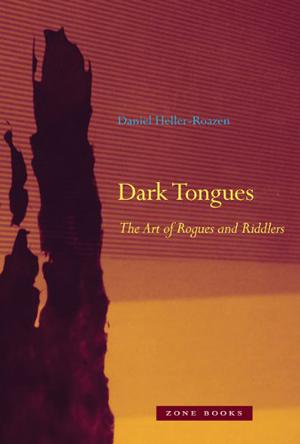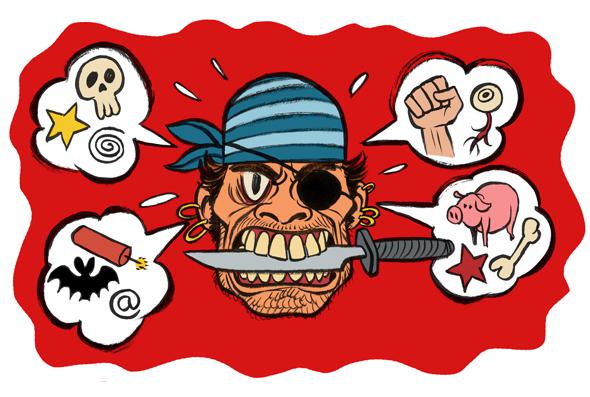On All Hallows Day, 1566, a beggar appeared at the door of a wealthy Kentish landowner and author named Thomas Harman. The beggar was naked from the waist up, his clothes were dirty, and his face was smeared with blood. He said that his name was Nicholas Jennings and that he was just out of Bedlam Hospital, having been afflicted with epilepsy for the past eight years. But Harman was having none of it. He told Jennings to go away and sent two boys to follow the beggar on his way. Trailing Jennings into London, the boys watched as he shed and assumed identities like suits of clothes. He applied blood from a bladder to renew his wounds, then transformed himself entirely, first into a sailor who had lost his ship at sea and then into a hatmaker who was new in town and looking for work.
Jennings was a “false beggar” and a “lying idler,” and Harman knew his kind better than most. For several years he had been at work on a book that would expose all the “lewd loiterers” and “crafty cranks” who roamed the countryside cheating, stealing, and looking for alms. In the course of investigations for this tract, published in 1567 as A Caveat or Warning for Common Cursetors, he came to realize that there was more to these vagabonds than met the eye. The rogues of England were governed by an elaborate hierarchy, running from Abram Men, who feigned madness, and Bawdy Baskets, female peddlers, all the way up to Upright Men, who commanded authority among the beggars in the land and could levy a tax on all those they met. Not only were beggars organized in their own society, but they also spoke a language of their own: cant.
Also known as peddler’s French, cant was the specialized tongue of thieves, cutpurses, and con artists. More than just slang or jargon, cant was an independent language, unintelligible to outsiders, an artificial English-within-English, which, according to the playwright Thomas Dekker, “none but themselves should understand.” Harman’s informants claimed that cant had been invented 30 years before in a cave by Cock Lorel, a legendary rogue and the king of the Gypsies, and while this almost certainly wasn’t true, it points to something else that was—cant was a recent creation, and not a unique one.
Practically every major European language had a canting speech of its own. In Spain, it was called germanía; in Holland, bargoens; and in Portugal, calão. The French jargon came to light in the trial of a group of Burgundian bandits in the year 1455—almost the same time that the great poet Francois Villon was composing ballads in the same exquisite and obscure language. Luther himself warned against the German rotwelsch or red Welsh, complaining that beggars had used it to gull him more times than he cared to admit and placing the blame for its arcane vocabulary squarely on the Jews. At the very moment when Renaissance humanists and authors were trying to standardize and purify their vernaculars into literary languages, they were discovering that they were already corrupt, riddled with dialects whose sole purpose was to deceive, to defraud, and to conceal.
That this almost universal tendency of human beings to create secret dialects out of the languages they speak shares something with poetry forms the opening premise for Daniel Heller-Roazen’s learned, perplexing, and occasionally scintillating new book, Dark Tongues: The Art of Rogues and Riddlers. It’s a slim book, made up of 11 short chapters on connected, though not necessarily related, topics. He begins by arguing that cant, with its exuberant deformation of traditional language, is itself a form of art: “To the degree to which thieves’ cants join and disjoin the phonological and semantic levels in their procedures, they come close, in structure, to the variety of literary discourse that Valéry once defined as the ‘prolonged hesitation between sound and sense.’ That variety is poetry.”But as the chapters progress, they roam further and further from the book’s original idea, spiraling out to consider a host of tangentially related subjects, from troubadour poetry and Old Norse riddles to the side projects of the linguist Ferdinand de Saussure. By the time we reach the final sections, which consider the possible existence of hidden sound patterns in early Latin poetry and Tristan Tzara’s obsession with anagrams in the works of Francois Villon, we’re left wondering what happened to the rogues and riddlers promised by the book’s subtitle.
The diffuseness of Dark Tongues is of a piece with the rest of Heller-Roazen’s work. As an academic—he’s a professor of comparative literature at Princeton—he has made habit out of eclecticism. In 10 years, he’s published books on a remarkable range of topics: the forgetting of language, piracy and the law, Pythagoras and harmony, Aristotle’s idea of the “inner touch” by which we know ourselves to be alive. Heller-Roazen’s books are essentially collections of essays, which trace an idea as it jumps across history, from Ancient Greece through Rome and the Arab world, before surfacing in the works of his favorite modernist authors and scholars: Benjamin, Jakobson, Joyce, and Freud. His chapters, sometimes brief enough to be called fragments, are invariably suggestive and, given the deep learning that underpins them, surprisingly light on their feet. He makes for an able guide with a gift for finding unexpected paths through the thicket of Western tradition.
Still, reading Dark Tongues, I found myself wishing that Heller-Roazen had been more willing to venture outside the green fields of philology. Literary historical nuggets, such as the troubadours’ practice of not naming their love objects or the Hittites’ habit of assigning multiple names to their deities, can be intriguing, but they distract from the central premise of the book, which is fascinating enough on its own. Not only that: It seems, in a deep way, to be true. Secret languages really are everywhere, and they aren’t just the special domain of vagabonds. They show up in every nation, and they belong to a surprising range of social groups.
Historically, cryptolects have been especially prevalent among service nomads: outsiders who provide settled populations with services they lack but are nonetheless met with hostility and mistrust, such as Gypsy coppersmiths, Irish Travelers, or the Sheikh Mohammadi peddlers of Afghanistan. Merchants the world over have developed their own languages to hide the true nature of their business from others. Examples include the specialized dialects of Yemeni businessman, Cairene goldsmiths, French butchers, Parisian prostitutes, Irish masons, and Jewish cattle traders, whose specialized dialect, nicknamed Loshen-Koudesh, appears to have persisted into the 20th century in, of all places, Orange County, N.Y.

Courtesy of Zone Books
Sometimes, cants jump between subcultures. Calunga, an Afro-Brazilian cryptolect spoken only by men, preserves a large number of Bantu-derived words brought to Brazil by slaves from Angola. In England, Parlyaree, the language of carnies and fairground showmen, migrated from its original milieu into the merchant marine, eventually turning into Polari, the secret language of English gay men and women until it fell out of use in the 1970s. At other times, cants become almost universal. In a study of a cryptolect spoken on an island off the coast of Panama, the linguist Michael Aceto made a list of occasions when it was used: by children, to exclude their peers; by students, to conceal things from their teachers; by parents, who wanted to communicate privately in front of their children; and by locals, who didn’t want to be understood by outsiders. With so many uses, it seems strange that it could be used to conceal anything from anyone.
In fact, some secret languages aren’t about secrecy at all. Often, they are products of the marginality of the people who speak them. Every group that is, in some way, set apart from a dominant, settled society because of ethnicity, caste, or profession—whether Jews, Gypsies, tinkers, peddlers, beggars—is liable over time either to retain its original tongue or, by dint of exclusion, to develop a language of its own. This holds for crooks as well. David W. Maurer, the 20th century’s leading student of American underworld slang, reported in The Big Con that most of his criminal informants were “amused at the idea that crooks are supposed to deceive people with their lingo.” Maurer spent decades studying the specialized language of pickpockets, con men, drug users, safecrackers, counterfeiters, and moonshiners and found that in most cases their individual cant or argot was simply a mark of their profession, “a union card … which takes several years to acquire and which is difficult to counterfeit.”
Secrecy ends up being something of a blind alley in Dark Tongues. Instead of diving into speculation about the existence of poetic codes, Heller-Roazen might have been better served by paying more attention to the lives of his original protagonists—or even to the poetry inherent in cant itself. After all, the word cant comes from the Latin cantare, “to sing,” and it’s hard to deny the “hesitation between sound and sense” in many of the dialogues recorded by Harman and his followers. Take this sentence: “The jug where his cush is, is an eye gaff, and I’m afraid of Old Poison getting the beef.” What would a trained literary scholar make of that? Unfortunately, we don’t know, because it’s from Maurer’s The Big Con, not Heller-Roazen’s book.
If Heller-Roazen had been interested in the answer, he might have written a less polite book, and one that could live up to the menace of its title. Dark Tongues opens a door, but cant is still waiting for a 21st-century successor to Thomas Harman and David Maurer. Whoever takes up the task ought to be less preoccupied with the words of scholars and more alive to cant’s place in the language we speak every day, as we go about filching loot, wearing duds, drinking pruno, roping marks, and counting our booty, shivs in hand.
—
Dark Tongues: The Art of Rogues and Riddlers by Daniel Heller-Roazen. Zone Books.
See all the pieces in this month’s Slate Book Review.
Sign up for the Slate Book Review monthly newsletter.
